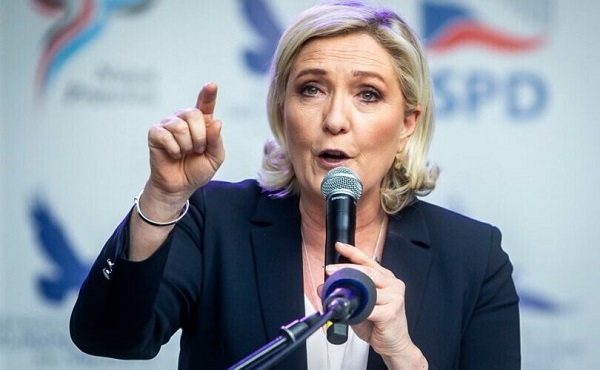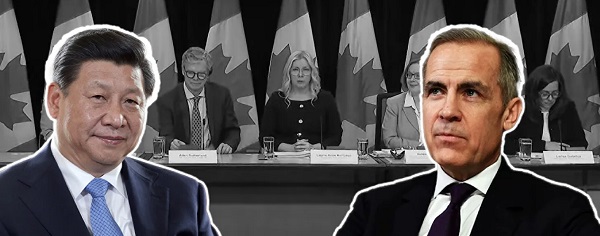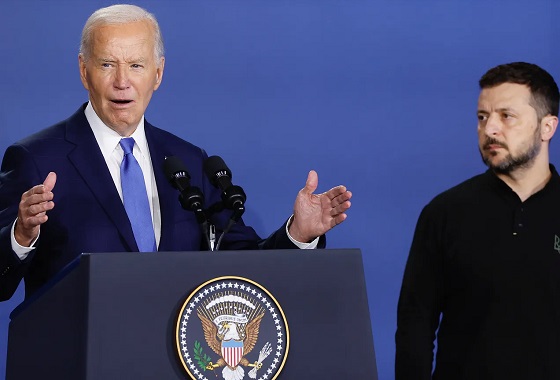International
Globalist elites are trying to ‘protect democracy’ by eliminating right leaning competition

Marine Le Pen of the National Rally Party in France has been completely vilified by the establishment
From LifeSiteNews
By Emily Finley
The classic definition of democracy is ‘rule by the people’. The elites have a new definition of ‘democracy,’ denoting democracy as hypothetical ideal.
Many are calling the present political turmoil in Europe a crisis of democracy. The German establishment is trying to ban the right-wing AfD Party for its alleged desire to return Germany to fascism. In France, the progressives are doing their darndest to hamstring conservative Marine Le Pen and her National Rally Party after they won the first round of the French elections. And in Romania, the Constitutional Court just nullified the results of a presidential election because the “right wing” victor ostensibly benefited from Russian “election interference.”
But which definition of “democracy” are we talking about? For the establishment leaders, the AfD, the National Rally Party, and Calin Georgescu are threats to democracy. For the supporters of these right-of-center parties and politicians, the progressive authorities are the threat to democracy.
It is time we make a clear distinction between these two varieties of “democracy” that we are told are in crisis.
The classic definition of democracy is “rule by the people” and indicates a concrete form of government. There is another definition of “democracy,” in currency among many elites, denoting democracy as hypothetical ideal. I call this ideological understanding “democratism.”
Populists worry about the survival of the former kind of democracy. The establishment worries about the survival of democratism.
On what basis do establishment leaders argue that excluding popularly elected parties and representatives of the people saves democracy? And that nullifying the results of a democratic election is in the name of democracy? There is, in fact, in America and Western Europe and its colonial satellites a tradition of conceiving of democracy as an ideal rather than the actual will of the people. Jean-Jacques Rousseau outlined this new understanding of democracy in his Social Contract in 1762. He argues that democracy is not the expressed will of the people but rather its ideal will, which he calls the General Will. Because the people are often uninformed, inclined to self-interest, and generally too narrow-minded to see the whole picture, they often deviate from that which is in their true interest, which is synonymous with the General Will. Therefore, an all-knowing and all-powerful Legislator must midwife the General Will into existence, even against the wishes of the people. If the people were to look deep down, Rousseau insists, they would see that the Legislator’s General Will really is their own individual will.
How often do we hear that those who voted for Donald Trump did not really know what was in their best interest? That they were duped? Or that the results of a popular election in Europe in which a “far right” candidate won was due to “interference” or social media misinformation adulterating the results of the election? Headlines and academic articles about this or that politician or political measure or social media platform subverting democracy to “save it” are too numerous to count.
It turns out that an entirely different notion of democracy, the one elaborated by Rousseau, is under discussion. For Rousseau as well as our own elite ministers of democracy, pluralism, coalition governments, compromise as imagined by the American founders, and genuine tolerance of opposing viewpoints are like so many defeats for “democracy” of the democratist variety.
Under democratism, there can be but one Public Will, which is identical to the will of the establishment elites. That a genuine plurality of legitimate political viewpoints could exist is inconceivable. John Rawls confirmed this Rousseauean interpretation of democracy with his Theory of Justice, which states outright that certain viewpoints are outside of the bounds of liberal democracy (as he conceives of it). This enormously influential work has largely set the tone for democratic studies inside and outside of the academy.
The concept of “democratic backsliding” is along these same lines. Backsliding from what? From the hypothetical ideal as conceived by the academicians and foreign policy establishment. The highly theoretical, democratist interpretation of democracy has now become the norm for many of our thought leaders.
In the face of legitimate popular grievances with the status quo, ruling elites are canceling elections, shutting down social media accounts, and using lawfare to take down political opponents. This makes clear that when these elites talk about “democracy,” they’re not talking about rule by the people.
How will this tension between the elites and the people be resolved? Handing down goals of “carbon neutrality,” ideological notions of “gender equality,” spreading democracy abroad, and other abstractions only further distances the elite from ordinary people who are concerned with high consumer prices, the abominable state of public education for their kids, and big hurdles to homeownership. Trump put his finger on the pulse, and he won the election because of it. The ascendency of populist and anti-establishment parties in Europe indicates that the same is happening there.
As the ruling elites continue to take repressive measures against their political opponents, we will see an increase in the rift between them and the people they claim to represent. If modern history is any indicator, a ruling body acting in its own interest and against the body politic will not enjoy power for long.
conflict
Zelensky Alleges Chinese Nationals Fighting for Russia, Calls for Global Response

 Sam Cooper
Sam Cooper
Ukrainian President Volodymyr Zelensky announced Tuesday that his forces have captured two Chinese citizens fighting as part of the Russian army in eastern Ukraine, alleging “there are many more Chinese citizens in the occupier’s units.” The stunning revelation could inject a volatile new dimension into ceasefire negotiations between the United States and Russia—and intensify already fraught tensions over Taiwan.
Zelensky shared the news in an X post, accompanied by video of one of the captured men—an Asian male in beige fatigues, hands bound with zip ties, visibly distressed as he gestures to a Ukrainian camera operator. The video shows the man making whirring sounds, crouching instinctively as if a drone is circling above and opening fire—then glancing up and uttering the English word, “commander.”
“We have information suggesting that there are many more Chinese citizens in the occupier’s units than just these two,” Zelensky wrote on X. “We are currently verifying all the facts—intelligence, the Security Service of Ukraine, and the relevant units of the Armed Forces are working on it.”
The president said he has instructed Ukraine’s foreign minister to urgently contact Beijing to clarify how China intends to respond.
“Russia’s involvement of China, along with other countries, whether directly or indirectly, in this war in Europe is a clear signal that Putin intends to do anything but end the war,” Zelensky wrote. “He is looking for ways to continue fighting. This definitely requires a response. A response from the United States, Europe, and all those around the world who want peace.”
Zelensky added that Ukrainian authorities had recovered documents, bank cards, and personal data from the two prisoners—material that could be pivotal in discovering the nature of China’s involvement.
If verified, the presence of Chinese nationals fighting for Russia could carry sweeping geopolitical implications. It would complicate delicate U.S.-Russia negotiations aimed at exploring a conditional ceasefire, and could have indirect ramifications on the plans of Washington, Tokyo, and Taipei in their growing confrontation with Beijing.
China has repeatedly denied providing direct military support to Russia. Zelensky’s statement marks the first time Ukraine has publicly alleged that Chinese nationals are embedded in Russian combat units—an allegation that, if substantiated, could alter the strategic calculus in both Eastern Europe and the Indo-Pacific.
Responding to Zelensky’s claims, Tom Shugart, a senior defense analyst at the Center for a New American Security and a former U.S. Navy officer, emphasized that the strategic implications hinge on whether the Chinese nationals were acting as mercenaries or state-directed personnel. “If the PRC is actively providing soldiers to fight in Ukraine, that would be altogether different—a possible sign of a real Axis that may best be resisted wherever it is fighting,” he wrote on X.
This is a developing story. The Bureau will continue to report as further details emerge.

Recommend The Bureau to your readers
2025 Federal Election
Election Security Briefing Confirms CCP-Linked Operation Boosted Carney


 Dan Knight
Dan Knight
While Beijing boosts Mark Carney on WeChat, federal officials downplay foreign interference, dodge accountability, and protect the very narrative propped up by the CCP.
As Canadians prepare to head to the polls on April 28, 2025, the federal government is working overtime to project an image of preparedness in the face of growing foreign interference, digital disinformation, and mounting public skepticism.
This week’s National Election Security Briefing—one in a series leading up to the vote—was framed as a gesture of transparency and reassurance. Led by Lauren Kempton, the session brought together senior bureaucrats from Canada’s intelligence, cybersecurity, and diplomatic corps. Among them: Allan Sutherland from the Privy Council Office, Vanessa Lloyd of the SITE Task Force, Bridget Walsh from the Canadian Centre for Cyber Security, and Larissa Galarza from Global Affairs.
They were joined virtually by officials from the RCMP, CSIS, and other federal agencies, forming what was presented as a united front against threats to Canada’s democratic process.
This briefing follows last week’s announcement of a new Candidate Security Program, offering private, unarmed security details to protect political candidates from intimidation. It’s a telling sign of the times—when running for office in Canada now comes with real, documented threats from foreign powers.
And if you thought foreign interference was yesterday’s problem, what came next confirmed: it’s not just back—it’s more sophisticated, more aggressive, and more deeply embedded than ever.
The WeChat Election: CCP Bots, Mark Carney, and the Digital Hijacking of Canadian Democracy
The latest federal election security briefing confirmed what many suspected but few in government are willing to say out loud: the Chinese Communist Party is actively trying to shape Canadian politics—and their current project of interest is Mark Carney.
Intelligence services revealed that a state-linked WeChat account called Youli-Youmian, tied directly to the CCP’s Central Political and Legal Affairs Commission, launched an information operation targeting Chinese-Canadian communities. The timing was not subtle. Two major spikes in activity occurred—on March 10 and again on March 25, right in the heart of the federal election campaign. The platform used was WeChat, a messaging app with over a billion users and a long record of CCP censorship, surveillance, and narrative control.
The operation focused on Mark Carney. He was the centerpiece. The content wasn’t one-sided, but it was manipulative. It praised him for being “tough” on the United States—exactly the kind of posture the CCP likes to see in Western leaders. At the same time, it seeded doubts about his experience and readiness to lead. The strategy is transparent: elevate the figure they believe will be most useful, then control the temperature of public perception around him.
The operation was not organic. Intelligence officials described it as “coordinated inauthentic behavior”—mass posting of identical headlines across outlets, bot-driven sharing, engineered engagement. This wasn’t a handful of users with strong opinions. It was algorithmic warfare.
The bureaucrats behind the briefing bent over backwards to downplay the impact. They said the campaign was “contained to one platform” and argued that Canadians have access to diverse information, so the overall electoral process remains “free and fair.” But that’s not the point. The CCP doesn’t need to control the entire media ecosystem. It only needs to shape perception where it counts—and in targeted communities, with targeted narratives, it’s clearly trying to do just that.
The Liberal Party was only briefed on the situation on April 6—after the second spike in activity. That’s weeks after the operation had already gained traction. What happened during that time? Carney’s campaign moved forward without addressing any of it. And now we know why. Whether he’s aware of it or not, the CCP sees value in propping him up—at least in the right communities, with the right messaging. If that doesn’t send alarm bells ringing, it should.
This isn’t speculation. It’s documented. It’s active. And it’s part of a larger pattern. The same interference networks have previously targeted Conservative MPs like Michael Chong, Erin O’Toole, and Kenny Chiu. They’ve gone after Chrystia Freeland too. But the recent attention to Carney marks something new—not just an attempt to tear down opponents, but to sculpt the image of a candidate who just might serve certain foreign interests, directly or indirectly.
The Chinese Communist Party doesn’t operate on party loyalty. It operates on leverage. And this operation—whether Carney asked for it or not—is a sign that Beijing believes his leadership could be shaped to their advantage.
The Canadian government can claim “no impact” all it wants. But influence isn’t always measured by votes—it’s measured by narrative, tone, and who ends up in the spotlight looking just a little more “strong” or “stable” through the right lens. Beijing’s lens.
The CCP’s Safe Bet: Mark Carney
And now, after days of playing cleanup behind a polished podium, the government rolls out a Q&A session to assure us that “nothing’s wrong,” “everything’s under control,” and that the CCP’s operation to shape the election isn’t a big deal because—get this—it only ran on one platform.
Let’s be blunt: the CCP isn’t playing to win headlines on Twitter. They’re not interested in going viral on Facebook. They’re targeting WeChat—because that’s where Chinese-Canadian voters live, talk, and form political opinions. And in that space, Beijing amplified Mark Carney—not because he’s “tough,” not because he’s competent, but because he’s good for China.
Canada has become a proxy battleground in a new Cold War between the West and the Chinese Communist Party. And Carney? He’s the CCP’s safe bet. Let’s not forget: this is the man whose financial career includes a quarter-billion-dollar loan from the Bank of China while chairing Brookfield Asset Management. The same man who’s never disclosed his full assets, despite now leading a party that’s still pretending foreign interference is just noise on the margins.
And now, in classic bureaucratic fashion, SITE and the government tell us they “don’t speculate on intent.” They claim the CCP is just sowing discord. That their approach is “party-agnostic.” That they weren’t trying to help Carney, just “pollute the digital environment.”
Give me a break. You don’t call someone a “tough opponent” to the U.S. and a “rock star” in a state-linked campaign unless you’re trying to boost their image. You don’t run coordinated bot amplification to spread content about one candidate because you’re bored and trying to “confuse people.” This wasn’t confusion. This was elevation.
And what did the government do? They flagged the content. They told Tencent about it. And then they backed off—because they don’t require any action. The PRC is running soft propaganda on a Canadian election platform, and Ottawa’s solution is: “Well, we told them. Hopefully they fix it.”
What’s worse? When asked about it directly, the government refused to name Carney as the beneficiary. They said they don’t want to “amplify the content” by repeating it. So let’s get this straight: Beijing gets to run a pro-Carney campaign, but Canadians aren’t even allowed to know the details?
That’s not protecting democracy. That’s protecting a narrative.
The truth is, Mark Carney is not being elevated because he’s good for Canadians. He’s being elevated because he’s safe for Beijing. The Liberals know it. The bureaucrats know it. And so far, no one in power has had the spine to stop it—because China’s interference benefits the very political class that claims to oppose it.
So when they talk about “safeguarding our democracy,” ask yourself: who are they really safeguarding it from? Because right now, it’s not from foreign influence—it’s from accountability.
Invite your friends and earn rewards
-

 Courageous Discourse1 day ago
Courageous Discourse1 day agoEurope Had 127,350 Cases of Measles in 2024
-

 2025 Federal Election2 days ago
2025 Federal Election2 days agoPierre Poilievre Declares War on Red Tape and Liberal Decay in Osoyoos
-

 Podcasts1 day ago
Podcasts1 day agoTrump’s Tariffs: The US, Canada, and the rest of the world
-

 Alberta2 days ago
Alberta2 days agoIs Canada’s Federation Fair?
-

 2025 Federal Election24 hours ago
2025 Federal Election24 hours agoMark Carney Comes to B.C. and Delivers a Masterclass in Liberal Arrogance
-

 COVID-192 days ago
COVID-192 days ago5 Stories the Media Buried This Week
-

 International2 days ago
International2 days agoBiden Lied About Everything, Including Nuclear Risk, During Ukraine Operation
-

 Business23 hours ago
Business23 hours agoTrump threatens additional 50% tariffs on China, urges ‘patience’







